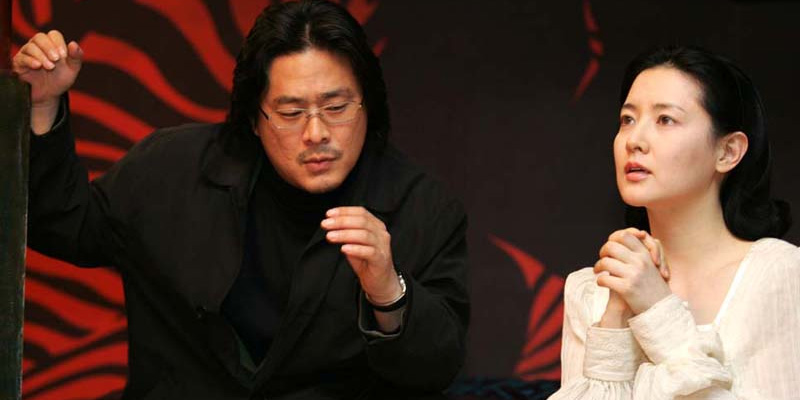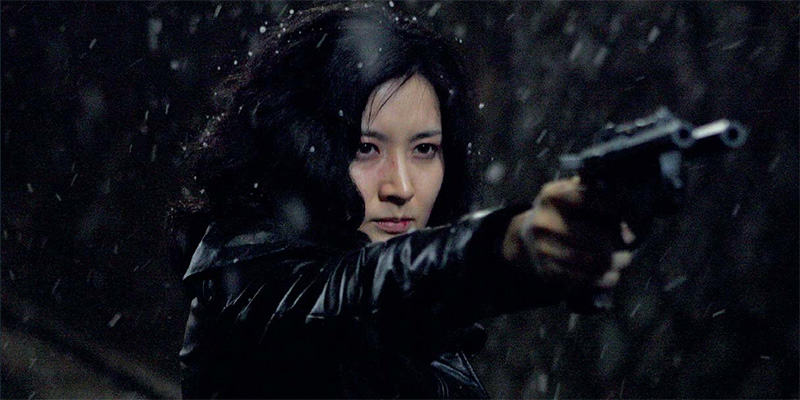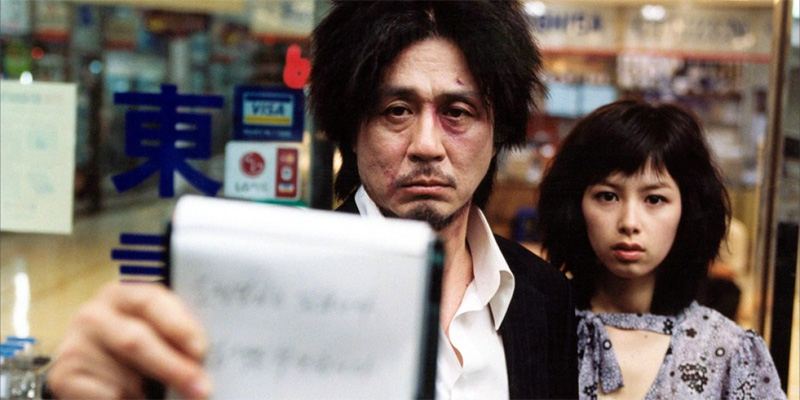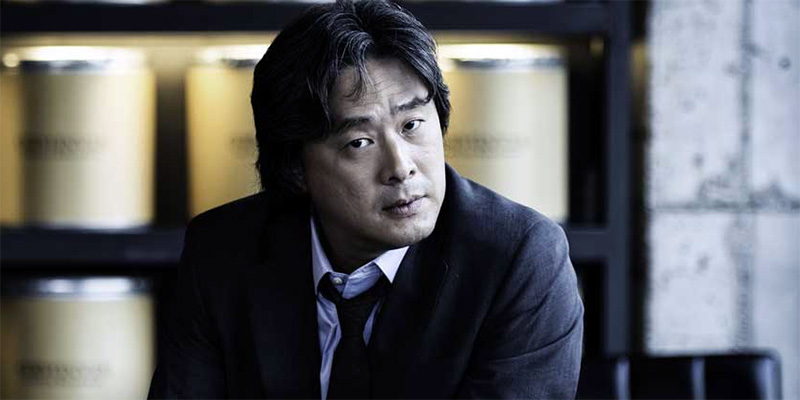Since ‘Oldboy’ exploded onto the stage at Cannes in 2004 Park Chan-Wook has overtaken such hefty competition as Takashi Miike and Kim Jee-Woon to become the most exciting Asian director currently working. ‘Oldboy’ was part two of a loose “Vengeance Trilogy”, the final instalment of which is the awe-inspiring ‘Sympathy for Lady Vengeance’, released in the UK as ‘Lady Vengeance’.
After setting the bar high with the Cannes Grand Prix winning ‘Oldboy’ (it would have won the Palmes D’Or if Tarantino had had his way), anticipation for ‘Sympathy for Lady Vengeance’ could not have been higher. Fortunately, the unflappable Park has produced his most narratively confident movie yet – a film that flits back and forward in time, uses of voiceover narration and shifting points of view, plus Park’s memorable visuals to tell its story of shocking murder and redemption.
I was lucky enough to catch up with Park Chan-Wook at the swanky Charlotte Street Hotel to chat about this impressive film.
SPOILER WARNING
In the course of the interview, the climax of the film, which crystallizes the Vengeance Trilogy’s themes, was discussed in-depth. You might want to check the movie out before reading on.

Rob Daniel: In ‘JSA’ the onscreen violence was relatively restrained. Why did you decide to make three and a half (Cut) darker films?
Park Chan-Wook: I wanted to tell vengeance stories, so the violence and darkness is unavoidable. Like a romance story has kissing, hugging, with these films the darkness was unavoidable.
RD: Was there any resistance from the studio in casting the wholesome Lee Young-Ae in the main role?
PC: No, it was just brilliant timing. People think that I followed her about to bring her to this strange film, but that’s not true. I was thinking about the female protagonist for the final instalment of the Vengeance Trilogy, and she said she wanted to work with me, so it was just a great coincidence. Lee Young-Ae herself was tired of playing the same role over and over again, good natured and pure. She wanted to get away from that and play a much stronger role. Having played such a role it’s safe for her to go back where she belongs in a more traditional role.
RD: Her performance is surprisingly terrifying – I’m thinking specifically about the scene when she hacks away at Choi Min-Sik’s hair. How much of that was your direction and how much did she bring to the role?
PC: Ah, I have things to say about this particular scene. The camera is the point of view of Mr Baek’s wife and the fellow inmate of Geum-Ja, and I asked Lee Young-Ae to look at the camera as if she suddenly felt the existence of someone else in the room after the intense concentration of cutting this man’s hair. But she said no, I don’t want to do that. So, I replied okay, do what you feel is right. So we are shooting the scene and suddenly she looks up at the camera – maybe she was feeling sorry because she didn’t say yes, because usually she follows my instructions very well. And she looked so horrifying I couldn’t stop myself yelling out. I liked the scene so much that I used the image on the poster at the Venice Film Festival.

RD: Why did you make religion so prevalent in the film?
PC: The religious motifs highlight the duality of Geum-Ja – the most holy and the most evil. I wanted to convey the notion of salvation in this final instalment, but I actually think this is an anti-religious film. There is a contrast between the white tofu that was given to Geum-Ja at the beginning of the film as means of purification and the cake she bakes towards the end of the film. The tofu is salvation from a supreme being, which she rejects, while the cake, after the climax, is judgement and forgiveness for herself by herself. People often ask if the film is Christian or Buddhist to which I reply, it’s Geum-Ja religion.
RD: Why did you choose a very stylized look for Geum-Ja?
PC: I wanted to get away from the stereotypical image of a female avenger or soldier, such as Sigourney Weaver or Linda Hamilton. I wanted to create an image that is feminine and beautiful in a woman who wishes to look beautiful, and contrast those desires with behaviour that is completely opposite.
RD: Were you afraid of going too far with the child-murders?
PC: Yeah, the effect is much more than I expected. But, the moment of murder is shown only once and even that is just a chair being taken away, you don’t even see the child being hung. The other scenes are of the children begging for life, but murder is shown just once. Even though it cuts away before you see the death, people think they have seen a horrific scene of bloody murder.
Actually I feel hard done by because the shot originally was seven frames longer, but when I saw it I thought this is too distressing and removed another seven frames. I tried to avoid dwelling on the distress of the children. I was aware of going too far but the reason why these scenes were absolutely necessary was to highlight how devilish this person is and how unworthy of sympathy he is. I needed to make the audience feel the anger of the families of the murdered children and I needed those scenes in order to say what I really wanted to say: is it justifiable to execute such a person however devilish he might be?

RD: Staying with this point, in an interview about ‘Oldboy’ you said that your characters’ mindsets and your mindset sometimes differ drastically. How do you view the actions of the parents and Geum-ja at the end of ‘Sympathy for Lady Vengeance’?
PC: Well, I wouldn’t have behaved like the families if I had been in that situation. I’d have been like the feeble father who left his wife to do it. But, that doesn’t mean that I don’t understand the others’ behaviour, I completely empathize with the parents. I think it’s a great ability of artists and film directors to bring out such empathy, so I study ordinary people to see what they would do in extreme situations.
RD: I’d like to finish with a question about ‘JSA’ -a film I found both fascinating and very powerful. Do you have anything else to say onscreen about the relationship between North and South Korea?
PC: I’ve been there, done that so I don’t want to make another film like that for the time being. But, I have another story that bears a resemblance to that involving the People’s Revolutionary Party, a group of progressive, liberal intellectuals in South Korea. They were accused of being North Korean spies and they were sentenced to death. This was a grave miscarriage of justice and I really want to make a film of the story, but I’m not sure when I’ll get to do it.
‘Sympathy For Lady Vengeance’ is available to buy from Amazon.com, Amazon.co.uk and YesAsia.com.
Far East Films would like to thank Park Chan-Wook and interpreter Dr. Keith Nam, plus Tartan Films (Laura Norton and Rachael Booth) for allowing us this interview.
- Web Of Deception - June 25, 2015
- Vital - June 22, 2015
- Visible Secret - June 22, 2015

